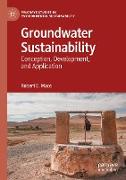- Start
- Groundwater Sustainability
Groundwater Sustainability
Angebote / Angebote:
This book provides a comprehensive discussion of groundwater sustainability, including what it is, how its definition has changed over time, why traditional assessments of it are wrong, how assessments of it are ideally multidisciplinary efforts recognizing that policy is more controlling of outcomes than science, and why achieving it is difficult once pumping exceeds sustainable levels of pumping. The book will provide a nontechnical background of hydrogeology relevant to groundwater sustainability and present several case studies from around the United States and the world. The book has been designed to appeal to academics, students, and practitioners. Academics, particularly those just getting into the subject, will find the book a useful entry in terms of management concepts and political realities of attempting to achieve groundwater sustainability. It will also be useful to academics in that the book will include discussions on the history and development of groundwater sustainability and the practical aspects of aspiring to and achieving sustainable production. Although not a textbook, the book could be used as the basis for teaching a course or as a supplement to a hydrogeology or groundwater management class. Accordingly, the book will include questions and additional reading materials at the end of each chapter. This book will also be useful to practitioners through non-technical explanations of the sciences, discussions of the nuances of defining sustainability in aquifers, and the presentation of case studies where sustainable management has failed and succeeded.Professor Robert E. Mace is the Executive Director and Chief Water Policy Officer at The Meadows Center for Water and the Environment and a Professor of Practice in the Department of Geography and Environmental Studies at Texas State University. He has over 30 years of experience in hydrology, hydrogeology, stakeholder processes, and water policy.Before joining Texas State University in 2017, Robert Mace worked at the Texas Water Development Board for 18 years, ending his career there as the Deputy Executive Administrator for the Water Science & Conservation office. While at the Board, he worked on understanding groundwater and surface-water resources in Texas, advancing water conservation and innovative water technologies such as desalination, aquifer storage and recovery, reuse, and rainwater harvesting, regional and state water planning, and protecting Texans from floods. Prior to joining the Texas Water Development Board, he worked at the Bureau of Economic Geology at The University of Texas at Austin as a hydrologist and research scientist.
Folgt in ca. 10 Arbeitstagen
